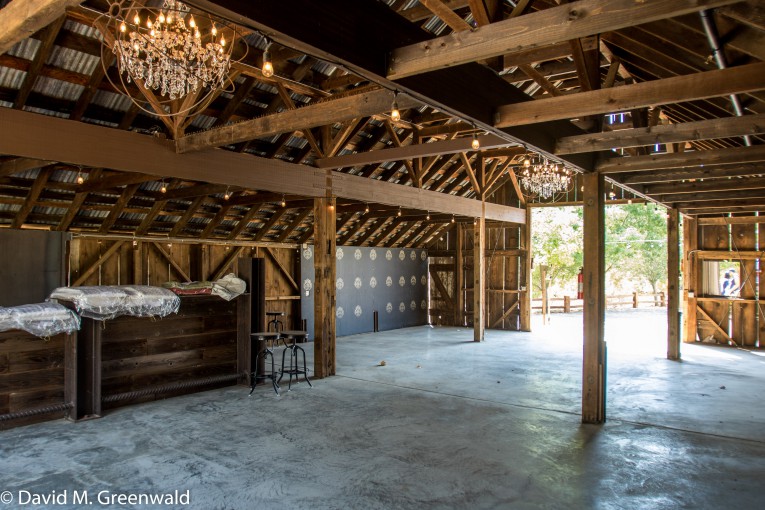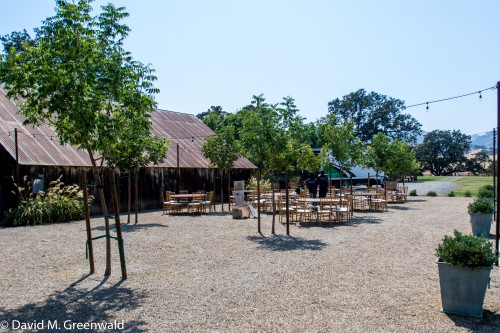

The County Board of Supervisors will make a final determination on the contentious Field & Pond event facility on Tuesday. Staff is bringing forward the Planning Commission’s decision not to approve the project as the recommended action, in accordance with county code.
The board has the ability to go either way, and staff recommends it should either deny the appeal, deny the project application and adopt associated findings – or the opposite, approve the appeal, approve the project and adopt associated findings.
The item is officially “an appeal of a decision by the Planning Commission not to approve a Use Permit for a proposed large special events facility and large bed and breakfast known as Field & Pond. On August 11, 2016, the Planning Commission held a public hearing to consider the Field & Pond Use Permit application and Mitigated Negative Declaration prepared for the project. The Commission voted not to approve the project and not to adopt the Mitigated Negative Declaration (1 for approval, 3 against, 1 recused, 2 absent).”
The applicants have now filed an appeal. According to county staff, the application, filed in April 2015, “has sparked a significant amount of public interest.”
Currently, large special event facilities which allow more than 12 events per year and/or more than 150 attendees or 100 trips per event require the issuance of a Use Permit in the agricultural zones. Staff notes, “There is also a provision in the Zoning Code that allows a property owner of a parcel greater than 40 acres to hold up to eight paid, for profit events per year, not more than one such event per month. The applicants have exercised this zoning allowance over the last year while the Use Permit application has been pending.”
Staff notes that the key concerns, which the Vanguard covered in its August 24 article, regarding the proposed project “arise from site constraints with respect to location and access, roadway safety, fire susceptibility, conflicts with agriculture, and biological sensitivities.” The key question is whether the project, as proposed, “is properly sited.”
Staff notes, “The project site’s rural location, with its backdrop against the Blue Ridge Mountains, lends itself to serene and rustic beauty, which is currently a sought after setting for a wedding. With the success of other permitted rural wedding venues such as Park Winters and others, the applicants were encouraged by the 2030 Countywide General Plan, which supports agricultural commercial and industrial support uses, where appropriate (Policy LU-2.2, emphasis added). Thus, in accordance with County Code Section 8-2.210(g), staff’s review of the proposal included an evaluation of impacts on the rural landscape and the identification of potential land use incompatibilities.”
Staff adds, “During staff’s review, the Agricultural Commissioner and Yolo Habitat Conservancy (YHC) were consulted, among other county and outside agencies, as addressed below. Based on feedback from the Ag Commissioner and spray permit conditions provided for reference, staff proposed several mitigation measures to limit the project’s scope to address the potential for conflicts with neighboring agricultural operations, particularly with respect to spray buffers. YHC also provided feedback with respect to the potential for special status species and/or their habitat to occur at and within the vicinity of the project site.”
At the Planning Commission meeting, the Commission adopted oral findings proposed by counsel that the requested permit does not meet the requirements for approval of a use permit under the Yolo County Code [Section 8-2.217(e)] because of concerns related to road hazards and potential conflicts with agriculture.
The applicants pushed back, arguing that the decision was biased and arbitrary, carried out by a partial commission, overtly political and based on inadequate findings.
Staff argues, “Although the appeal was filed within the appeal period, the appeal did not discuss or analyze evidence to support any of the claims itemized above. Therefore, Staff cannot properly address each claim with specificity.”
Staff writes, “It is unclear whether the applicant’s claim of a ‘partial’ Commission refers to the number of Commissioners present at the meeting, or a commission that was not impartial. Staff disagrees that the Commission was not impartial.”
Staff also disagrees that “the Planning Commission’s decision was made arbitrarily given that the project had been subject to thorough vetting, individual meetings with the applicants, site visits, meeting with neighbors in opposition, pouring over staff materials provided at the August 11, 2016, public hearing, the February 2016, public workshop, two CEQA review periods, as well as their individual efforts to better understand the merits of the project in light of a newly adopted Zoning Code and updated General Plan. After nearly three hours of public testimony, each Commissioner gave a lengthy summary during their deliberations prior to making a final decision.”
Staff further notes that “applicants deviate from their application when they ask the Board to approve a nine-room bed and breakfast in the three existing structures on the property. The original request included five rooms in the main house and four future rooms in stand-alone bungalows. The appeal modifies this request to omit the four stand-alone bungalows, but allow a more intensive use of the two other existing residences at the project site, each apparently containing two bedrooms.”
Staff is bringing forward the Planning Commission’s decision not to approve the project as the recommended action.
Staff has also provided the Board its previous staff recommendation to the Planning Commission, “At the Planning Commission meeting, staff recommended a significant reduction in the number of allowed annual events, from the applicant-requested 35 and the CEQA-analyzed 20, to a total of 12 events. It should be noted, though, that the Mitigated Negative Declaration prepared for the project found that environmental impacts could be mitigated to less than significant levels if the number of events was limited to 20.”
Accordingly, “[T]he Board is free to approve any amount of events up to the 20 event cap included in mitigation measures set forth in the CEQA document; anything more would likely require further environmental review.”
The Soluri Meserve Law Corporation has submitted, on behalf of the Farmland Protection Alliance. their letter of opposition to the project. They argue that the Board “may not consider the ‘Revised’ project that Field & Pond has proposed in its appeal,” arguing that the existing MND (Mitigated Negative Declaration) is “inadequate to describe the new project proposed by Field & Pond.”
Like the neighbors, they also, argue that the project is not large enough to support requested uses. “Although the total acreage of the site is 80 acres, the usable area is only about 11 acres. This does not leave enough room for agricultural spray buffers or the recommended protections for Tricolored blackbirds during nesting season.”
Perhaps the most interesting part of the argument that the law firm makes is the case that Field & Pond is not entitled to hold any events by right on the site.
They write, “Many may believe that Field & Pond may hold eight events per year ‘by right’; this is unsupported by the text of the Yolo County Code. Under the Code, a ‘special event facility’ located on a parcel greater than 40 acres is allowed by right to hold no more than eight events per year, subject to restrictions on number of attendees and vehicle trips generated.”
They argue, “Among other evidence, the Planning Commission’s findings supporting denial of Field & Pond’s application stated that the permit would not meet Yolo County Code requirements for a use permit due to road hazards and concerns with Project compatibility with agricultural uses. These are precisely the types of concerns that remove a special event facility’s ‘right’ to hold up to eight events per year. Thus, because the Planning Commission has determined that the Project-related road hazards and conflict with existing agricultural uses make a use permit inappropriate (among other conflicts), the Project is correspondingly ineligible under the Code to hold eight events per year in absence of this permit.”
In the end, the Board of Supervisors will get the final say on these matters. The hearing will be at 1 pm on Tuesday.
—David M. Greenwald reporting

What are the current allowances for Park Winters? I am still confused about what was allowed and why they apparently were led to believe they could increase the events.
I think they bought themselves a lovely home and small farm.
That would be a shame. It’s a great site and great location and we need the agritourism. I see this as another NIMBY issue with the neighbors unwilling to work out a compromise. I have faith that the BOS will.
This is rural land, so if true, it’s more like NIBOMF, Not In Back Of My Field.
Chamber Fan
“we need the agritourism.”
“Agritourism or agrotourism, as it is defined most broadly, involves any agriculturally based operation or activity that brings visitors to a farm or ranch.” on Wikipedia
“Agritourism. Agricultural tourism is a commercial enterprise at a working farm or ranch conducted for the enjoyment and education of visitors, and that generates supplemental income for the owner or operator.” – UCD definition
I have no strong feelings one way or the other about this particular proposal, but I would like to point out that I believe from what I have read here on the Vanguard, it would be a stretch to call this rural B&B and wedding/party site “agirtourism” which by these definitions implies that there is an agriculturally based operation to which the other activities are supplemental.
” it would be a stretch to call this rural B&B and wedding/party site “agirtourism””
It is a stretch to include such nefarious disciplines as image enhancement therapy, chiropractic and acupuncture as “Medical treatments,” but so many hospitals and medical groups do that insurance companies have to pay for it.
Biddlin
“t is a stretch to include such nefarious disciplines as image enhancement therapy, chiropractic and acupuncture as “Medical treatments,” but so many hospitals and medical groups do that insurance companies have to pay for it.”
I am at a total loss as to the relevance of your comment. First you have presented no definition of the term “medical treatment” which would preclude alternative therapies. Then you present a set of completely unrelated terms some of which have demonstrated medical benefits, and some of which do not to the best of my current knowledge that I cannot even tell if you are serious with this post or just playing on my post.
I’m saying that your definition of agritourism is as narrow as mine of medical treatments.
(Do you really believe the alternative therapies mumbo jumbo? I reckon they should all be subject to the same standards of proof as Western medicine, at which they have always failed.)